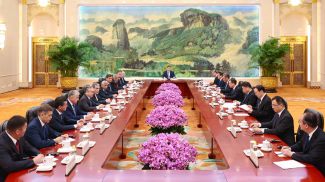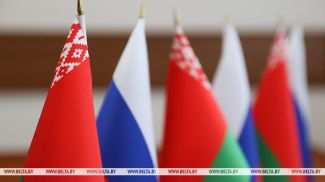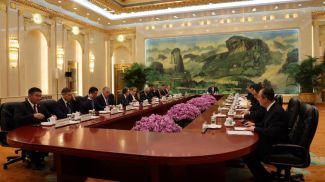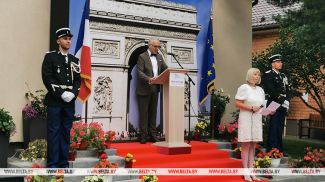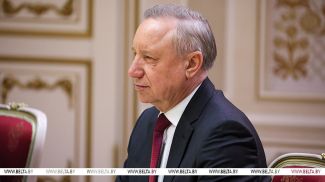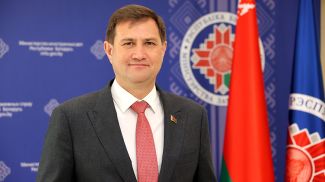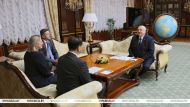Andrei Savinykh, Chairman of the Standing Committee on International Affairs of the House of Representatives, provides his take on the foreign policy doctrine of Belarus.
In the mid-1990s during a systemic crisis the Belarusian president proposed the concept of a multi-vector foreign policy. It suggested that the Ministry of Foreign Affairs and other ministries advance cooperation with as many international actors as possible - foreign and international organizations.
The main goal set before the Ministry of Foreign Affairs was to ensure favorable external conditions for the country's social and economic development.
For almost 30 years, this work has been carried out systematically, constructively and quite effectively. Very quickly the country developed a network of foreign institutions in key countries, and formalized membership in all the leading international organizations. The inflow of technical aid and credit resources to Belarus was ensured on a permanent basis. All diplomatic missions worked to ensure the growth of Belarusian export and to attract investments and manufacturing cooperation projects on favorable terms.
I can confidently say that all international programs and terms of cooperation were always assessed against the needs of the social and economic development of the country and our citizens.
The Ministry of Foreign Affairs has never violated this principle for the sake of short-term political dividends.
There is one important thing that I would like to highlight. Unlike other countries, Belarus has never taken foreign policy decisions that would benefit one social group to the detriment of others. National interests have always been at the forefront. In my work I often came across examples of reverse behavior in other countries.
The world's leading countries actively pretend that we live in a world of international law and common principles, and this is the paradox of today's world. In reality, countries like Belarus have often been encouraged to interact – and now it is becoming the norm – on the old and long-tested principles of "realpolitik", which means relations are based on the balance of force potential – the one who is stronger has more rights.
We should say openly that our partners have always pretended to be concerned about creating a just world that provides equal development opportunities for all the countries. It seems, however, that even this pretense is a thing of the past now. The looming phase of a systemic crisis is casting political correctness away. The behavior of U.S. President Donald Trump is a vivid confirmation of it. In this context, it will be curious to see the metamorphosis that will happen to European leaders. There are only two options here. They will either follow Trump's example or be swept away from the political arena by a new generation of leaders such as Marine Le Pen, for whom “realpolitik” will come natural.
It should be recognized that this principle used by the high and mighty has not allowed the Ministry of Foreign Affairs to fulfill some of the tasks such as joining the WTO or signing a comprehensive cooperation agreement with the EU. But, undoubtedly, it was not through the fault of Belarus.
Speaking about the multi-vector foreign policy concept, I would like to note that similar approaches have been used by virtually all the CIS countries, including Russia, for decades. There is nothing surprising about it. We all tried to “fit in” with the new global world having survived the largest economic and social catastrophe in recent history.
There is nothing permanent in the universe, and never will be. Today we can see how attempts to create a global American-centric world are failing. The world political order is beginning to change, imminently moving towards regionalization, a multipolar world, the world of associations of states or macro-regions. Practically all old models and approaches of interaction, as well as stereotypes of perception of the possible, acceptable or desirable, are breaking down or seriously transforming.
These processes, however, are very slow. Their progress can be explained by the growing war of the Western elites with each other. Global financial elite groups, which have invested most of their huge resources in the globalization, are fiercely resisting the division of the world into different centers of power. The logic of this large-scale conflict with all the countries, including Belarus, drawn into, suggests that the winner will get everything. The losing side will be blamed for all the troubles and problems. That has happened more than once in history. That is why we witness the growing severity of the conflict and large-scale social upheavals.
The assessment of these trends is too large a subject and requires a serious analytical work of all the public services in all the states. I can assure you that this work is in full swing as it will influence all the aspects of life, including foreign political doctrines of all the countries.
We should also perform this analysis. First of all, Belarus should analyze how well its multi-vector foreign policy corresponds to the circumstances and conditions of the present-day international life.
The main question in our foreign policy is how the trends in moving towards a multipolar world can influence the country's foreign policy doctrine. This question is becoming more and more crucial as time goes by.
In my opinion, we already have enough reasons to say that amid the clash of geopolitical interests, the process of grouping into macro-regions, and the destruction of the global trade and financial system, the multi-vector policy does not ensure the necessary external conditions for Belarus' favorable development anymore.
I believe that this policy needs adjustments. The current political events only highlight the necessity for a new foreign policy paradigm that will have to suggest new foreign policy priorities.
I am sure that strengthening political, economic, and military relations with the Russian Federation within the framework of the Union State of Belarus and Russia remains our number one priority. This country has always been our main and closest strategic partner.
Our main goal in this respect is to make part of the core of the nascent Eurasian macro-region.
Another top priority is advancing relations with the member states of the Eurasian Economic Union. To my mind, the common future goal should be a gradual expansion of this union by including the CIS member states and other Eurasian countries. The aim of the expansion will be to create a true independent macro-region with its own independent financial system and market, and an elaborate system of division of labor.
The main second-tier priority will probably be our bilateral relations with Eurasian countries: China, Turkey, Vietnam, Iran, and India. These relations should benefit Belarus and should not act against the interests of the Eurasian macro-region, but serve them.
Perhaps, the relations with the EU and the USA or the so-called Western world should also be a second-tier priority in view of the geographic proximity and considerable, although decreasing, military and economic capacity. But we should view the development of these relations taking into account geopolitical risks and focus on trade, economic, digital, scientific, and environmental cooperation, which will reflect the status of our relations. And nothing more!
There is no doubt that Belarus will be open for relations with other countries in Southeast Asia, Latin America, in the Middle East, but only if the interests are mutual. Cooperation with these countries, in my opinion, should be viewed as an additional factor contributing to our economic growth and development.
Of course, we will continue to provide the diplomatic support to Belarusian large corporate projects. For example, there is the Belarusian Potash Company (BPC), a big player on the global fertilizers market which should be operational on all markets. In this context, I probably can also mention MTZ or the Belarusian machine-building complex as a whole.
Once new Belarusian transnational companies emerge, we will need to implement certain programs of foreign policy support, as it is now done by foreign policy agencies in all developed countries. There is an important condition of such support. An enterprise can be of any form of ownership but it should be headquartered and pay taxes in Belarus.
While the multi-vector policy focused on the search for new windows and opportunities all over the world, the new foreign policy doctrine, in my opinion, will concentrate on the intensification and diversification of Belarus' positions on traditional markets. Branching out into new markets will be replaced by the efforts to maximize returns and strengthen positions, promote cooperation on the traditional markets.
I think that in the new conditions the doctrine will also provide for measures to counteract and, in some cases, block various negative trends in international relations.
Belarus is a relatively small country with limited resources which should inject these resources into the most promising industries. Even in the past we could hardly afford a global foreign policy doctrine. Today it becomes excessive, counterproductive even.
Of course, in this article I am not trying to promote a new foreign policy doctrine. I just share my opinion on the subject matter in a rather fragmentary way.
The development of a new foreign policy doctrine is the prerogative of the president and conceptual parameters of proposals on working out the doctrine require serious methodological work from the entire Ministry of Foreign Affairs. I am confident that the time for this work and these changes has come!




